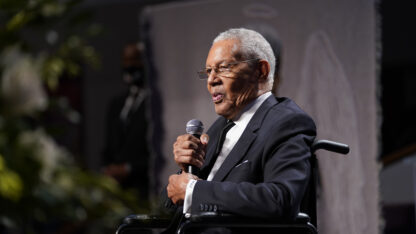Target confirmed that it won’t be carrying its LGBTQ+ merchandise for Pride month in June in some stores after the discount retailer received backlash last year for its assortment that also cut into sales.
Target, which operates roughly 2,000 stores, said Friday that the decision to offer Pride merchandise, including adult apparel, home products, food and beverage at the stores will be based on “guest insights and consumer research.”
A Target spokeswoman declined to disclose the number of stores that won’t be carrying the merchandise. But a full assortment will be offered online, Target said.
“Target is committed to supporting the LGBTQIA+ community during Pride Month and year-round,” Target said in an emailed statement to The Associated Press. “Most importantly, we want to create a welcoming and supportive environment for our LGBTQIA+ team members, which reflects our culture of care for the over 400,000 people who work at Target. ”
The moves, first reported by Bloomberg, come after Target removed some items from its stores and made other changes to its LGBTQ+ merchandise nationwide ahead of Pride month last year after intense reaction from some customers who confronted workers and tipped over displays. Target also moved Pride displays to the back of its stores in certain Southern locations last year.
But Target faces a second backlash from customers upset by the discount retailer’s reaction to aggressive, anti-LGBTQ+ activism, which has also been sweeping through Republican state legislatures. Civil rights groups had scolded the company for caving to anti-LGBTQ+ customers who expressed outrage over gender-fluid bathing suits that it had carried. The anti-LGBTQ+ customers also posted threatening videos on social media from inside the stores.
Target’s latest moves are just another example of how companies are struggling to cater to different groups of customers at a time of extreme cultural divides, particularly around transgender rights. Last year, brand Bud Light got negative response from customers angered by its attempt to broaden its customer base by partnering with transgender influencer Dylan Mulvaney.
Target, based in Minnesota, and other retailers including Walmart and H&M had been expanding their LGBTQ+ displays to celebrate Pride month for roughly a decade. But last year transgender issues — including gender-affirming health care and participation in sports — have been a divisive topic in state legislatures and the backlash has turned hostile.
But Target’s move to scale back its presence of Pride merchandise for this year isn’t unexpected.
Last August, CEO Brian Cornell told reporters that Target learned from the backlash and said that it will be more thoughtful in merchandise offerings for its heritage months, which celebrate various ethnic and marginalized groups. Target said it will have a slightly more focused assortment and will reconsider the mix of its own and national brands with its external partners.
“As we navigate an ever changing operating and social environment, we’re applying what we’ve learned to ensure we’re staying close to our guests and their expectations of Target,” he said.










